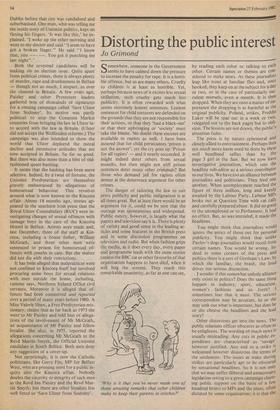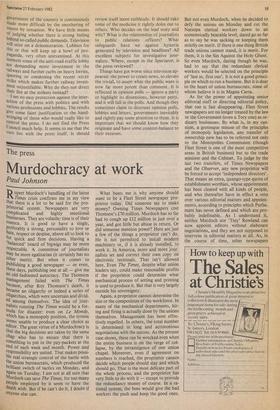Distorting the public interest
Jo Grimond
C omewhere, someone in the Government
seems to have calmed down the pressure to increase the penalty for rape. It is a horri- ble offence, but so are many others. Cruelty to children is at least as horrible. Yet, perhaps because news of it excites less sexual titillation, such cruelty gets much less publicity. It is often rewarded with what seems extremely lenient sentences. Lenient sentences for child torturers are defended on the grounds that they are not responsible for their actions, or that they 'had a black-out' or that their upbringing or 'society' must take the blame. No doubt these excuses are available to rapists as well. I have been assured that for child persecutors 'prison is not the answer'; yet the cry goes up 'Prison for all rapists' — and it nearly succeeded. It might indeed deter others from sexual assaults, but then might not stiff prison sentences deter many other criminals? But those who demand jail for rapists often demur at the deterrence argument for other crimes.
The danger of tailoring the law to suit press publicity and public indignation is at all times great. But at least there would be an argument for it, could we be sure that the outrage was spontaneous and widespread. Public outcry, however, is largely what the papers and television say it is. There is plenty of variety and good sense in the leading ar- ticles and some features in the British press and in some discussion programmes on television and radio. But when fashion grips the media, as it does every day, every paper and programme leads with the same stories (unless the BBC cat or other favourite of that organisation happens to have died, when it will hog the screen). They reach this remarkable unanimity, as far as one can see, `Why is it that you've never made one of those amusing remarks that other children make to keep their parents in stitches?' by reading each other or talking to each other. Certain names or themes are con- sidered to make news. At these journalists leap like trout at familiar flies and, once hooked, they keep on at the subject for a day or two, or in the case of particularly suc- culent morsels, even a month. It is then dropped. When they are onto a matter of im- portance the dropping is as harmful as the original publicity. Poland, strikes, Freddie Laker will be spat out in a week or two, relegated not to the back pages but to obli- vion. The lessons are not drawn, the public's attention fades.
The press is by nature ephemeral and closely allied to entertainment. Perhaps then not much more harm need be done by these well headlined sallies than by the page 3 girl in the Sun. But we now have investigative journalism, which sees the headline sub-editor as a serious contributor to our lives. We have too an alliance between journalists and politicians. They feed one another. When unemployment reached the figure of three million, long and keenly awaited by the Labour Party, Labour MPs broke out at Question Time with cat calls and carefully prepared abuse. It did no good, to the unemployed or to Parliament. It had no effect. But, as was intended, it made the headlines.
You might think that journalists would ignore the antics of those out for personal publicity. You might think that unlike Pavlov's dogs journalists would recoil from certain names. You would be wrong. In- deed in some corners of the press and politics there is a sort of Gresham's Law, by which the familiar, the brash, the loud drives out serious discussion.
I wonder if this somewhat unholy alliance only exists in politics? Does the same thing happen in industry, sport, education, women's fashions and so forth? I sometimes fear that it must. The serious correspondent may be accurate, he or she may seek out what is important, but does he or she choose the headlines and the lead story?
Other distortions get into the news. The public relations officer obscures as often as he enlightens. The wording of much news is usually misleading. Any cuts in public ex- penditure are characterised as 'savage' however justified. Any end to a strike is welcomed however disastrous the terms of the settlement. The issues at stake during strikes are particularly apt to be obscured by sensational headlines. So it is not only that we may suffer illiberal and unnecessary legislation owing to a press campaign claim- ing public support on the basis of a few hundred letters to MPs and the press, often dictated by some organisation; it is that the government of the country is continuously made more difficult by the smothering of reason by sensation. We have little means of Judging whether there is strong feeling behind so-called public demands. Television will seize on a demonstration. Lobbies for this or that will keep up a howl of pro- Paganda, very often unexamined. At this moment some of the anti-road-traffic lobby are demanding more investment in the railways and further curbs on heavy lorries, ignoring or condoning the recent ASLEF strike which makes further railway invest- ment unjustifiable. Why do they not direct their fire at the strikers instead?
I see no easy protection against the inter- action of the press with politics and with various professions and lobbies. The results give some faint justification to the hand- wringing of those who would really like to Control the press. 1 do not find the Press Council much help. It seems to me that the cure lies with the press itself. It should
review itself more ruthlessly. It should take some of the medicine it rightly doles out to others. Who decides on the lead story and why? What is the relationship of journalists to public relations officers? What safeguards have we against hysteria generated by television and headlines? All excellent subjects for investigative jour- nalists. Where, except in the Spectator, is the press reviewed?
Things have got worse since television ap- peared: the power to create news, to elevate the trivial, to assert what the public want is now far more potent than comment. It is reflected in opinion polls — ignore a party or highlight its dissensions, however petty, and it will fall in the polls. And though they sometimes claim to discount opinion polls, lobbies and letters, governments inevitably and rightly pay some attention to them. It is important that we should know how they originate and have some counter-balance to their excesses.





































 Previous page
Previous page